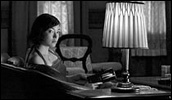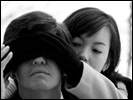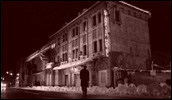Starfish Hotel
- Year
- 2006
- Original title
- Sutafishu Hoteru
- Japanese title
- スターフィッシュホテル
- Director
- Cast
- Running time
- 98 minutes
- Published
- 11 February 2007



by Adam Campbell
Director John Williams is in the interesting position of being a Welshman making Japanese films. His debut feature Firefly Dreams managed to convey a simple and genuine story without being propped up on his foreignness or praying at the altar of something inherently national to Japan (such as Café Lumiere did intentionally with regards to Ozu.) For his second effort, Williams has tried to broaden his scope, as any director is wise to attempt: Starfish Hotel is a supernaturally tinged mystery film.
Koichi Sato plays Arisu, another face-in-the-crowd salaryman type. Arisu seems entertained by neither his work nor his beautiful wife. His only source of interest lies in the works of Jo Kuroda, an author of (what else) supernatural mystery novels. Two strange events lead Arisu into an investigation of his own: an encounter with a disturbing man in a rabbit costume, and the sudden disappearance of Arisu's wife.
First the good news. Koichi Sato continues to distinguish himself as a leading man of talent and range. While his role here doesn't particularly stretch him, his work is an about-face from something like Koki Mitani's Suite Dreams (The Uchoten Hotel, 2006). Even in his depictions of desperation in both, he matches the individual tone of the project as a whole. Unfortunately Starfish Hotel is devoid of levity so I can't compare performances in that regard. Akira Emoto, another fine established actor often seen bobbing around some of the most famous Japanese exports of the last twenty years, does good work as Mr. Trickster, the man in the rabbit suit harassing Arisu. He combines deranged and pathetic well, and he can play both quite easily with that peculiar face. A weak link is Kiki. She is beautiful of course, but her attempts at a femme fatale are undermined by her overly dreamy delivery. She also insists on rotating her head through every degree of articulation during her performance. Was this "sultriness", "otherworldliness", or "bobbing ornament on the dashboard of an old Fiat"? We may never know. Generally speaking though, the cast is very solid and Williams has done well to gather them. Certainly they don't do any disservice to script.
Cinematographer Benito Strangio also helps. He and Williams have at least a colour and lighting palette so that this doesn't look like a TV drama. Reality is stark and monotonous where places firmly wrapped in the Darkland are warm, rich, and defused. Most of the production design work is good, especially the titular hotel, and the only real black mark is the brothel which looks a bit like something from an early nineties music video, dressed as it is with questionable multi-coloured curtains. Naturally, there are locations where the two visual designs mix as well, such as an underground walkway that hosts a sex scene. In that same scene Williams makes one of his better choices behind the camera, giving us a suitably voyeuristic position, shooting the couple from a distance. As with the assignments of colour and light, it's not particularly original but it works.
The film raises an interesting question. Unfortunately it's neither "What happened to Arisu's wife?" nor even "What is going on?" but rather "When does something stop being a homage and start being simply derivative?" Haruki Murakami is the most obvious name that comes to mind when watching the film and that should be fine. The director claims to be a fan, he's certainly read a few because not just themes but actual plot points from the author's work are to be found within. I was actually beginning to wonder if Kiki was cast in the film for the connection between the actress' name, the character, and a similar one in "Dance Dance Dance". David Lynch might also want to check his box of tricks to see if any of them are missing. It doesn't stop with worthy references either. Mr Trickster, the mysterious and ambiguously helpful guide / rabbit man looks extraordinary like Frank, the mysterious and ambiguously helpful guide / rabbit man from Richard Kelly's Donnie Darko (and of course Murakami's Sheep Man character). It comes to mind that if there would have to be such a character, it would be better if he wasn't a rabbit. And if he had to be a rabbit, it would be better if he didn't look like the most obvious previously filmed example in recent cinematic history. We can't imagine this is an accident, so as a deliberate move, what is it telling us beyond "I saw Donnie Darko, but still thought this was a good idea"?
The necessity of Mr. Trickster to even be a rabbit is due to another regrettable reference. Bearing in mind that Sato's character name "Arisu" is the Japanese pronunciation of Alice, hold on to your seats as I tell you "Alice" chases the rabbit into a dark hole to reach "Wonderland", in this case the aforementioned brothel. If your eyes didn't roll out of your head when reading that last sentence, you just may enjoy this picture. The problem with these obvious allusions and references is that if you get them, you're more likely to be bothered with them and if you don't get them you are unlikely to be watching a film like this in the first place.
So suffice to say the film hasn't much to say in an original way, nor does it manage to diffuse these inspirations into itself, and thereby integrate itself into the same world of the sources. Rather you will likely catch yourself on the jagged edge of every piece of borrowed material that has been shoved in. It only serves to highlight the movie's desperation to be like that material. This is indeed a film that is trying much too hard - it's almost palpable, and perhaps this goes against something in Williams, something that made a success of a more relaxed and observational style in Firefly Dreams.
The picture falters elsewhere as well. The music knows no subtlety, all screechy violins and echoing piano in case you forgot something weird is going. The script is unfortunate in that it manages to be rather boring. When a film has a giant rabbit, murder mysteries, literary insertion and still manages to be boring, you are in trouble. One problem is that the film is rather humourless. There's rarely anything excellent that isn't even a little bit funny, especially in noir, but it's often needed even more in the face of the absurd. A problem with the plot is that the mystery itself isn't one. Instead it leans on that old crutch, the disordered narrative, and not particularly steadily.
While Williams has apparently proved himself with his debut feature, and should continue to experiment in the type of films that he makes, he can't quite make this Frankenstein's monster walk. It's therefore very difficult to recommend this movie over any one of its influences. There's probably a more engaging time to be had with a stiff drink, a copy of Murakami's "Dance Dance Dance", and "Out of the Past" on DVD.